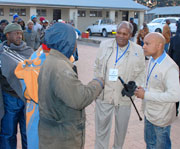 The landlocked country of Lesotho conducted a keenly contested parliamentary election on May 26, 2012. Fifteen political parties and several independent candidates vied for the 120 parliamentary seats, of which 80 were settled by a first-past-the-post system and 20 by a proportional representation system. The major contest was with former Prime Minister Pakalitha Mosisili—in office since 1997, who ran on the platform of his newly-formed Democratic Congress party after abandoning his former party, the Lesotho Congress for Democracy—and Motsoahae Thomas Thabane, who ran on the platform of the All Basotho Convention. Pakalitha Mosisili’s Democratic Congress Party won 48 seats; the All Basotho Convention won 30 seats; and the Lesotho Congress for Democracy won 26 seats.
The landlocked country of Lesotho conducted a keenly contested parliamentary election on May 26, 2012. Fifteen political parties and several independent candidates vied for the 120 parliamentary seats, of which 80 were settled by a first-past-the-post system and 20 by a proportional representation system. The major contest was with former Prime Minister Pakalitha Mosisili—in office since 1997, who ran on the platform of his newly-formed Democratic Congress party after abandoning his former party, the Lesotho Congress for Democracy—and Motsoahae Thomas Thabane, who ran on the platform of the All Basotho Convention. Pakalitha Mosisili’s Democratic Congress Party won 48 seats; the All Basotho Convention won 30 seats; and the Lesotho Congress for Democracy won 26 seats.
A major criticism of the election campaign was the failure of the candidates to discuss pertinent issues confronting the country; instead they focused on personality issues. Lesotho has one of the world’s highest HIV/AIDS prevalence rates, with one in four persons living with the HIV virus. A further complication is the problem of poverty—high unemployment rates have rendered many people in the rural areas helpless. An economic downturn in South Africa, which completely encircles Lesotho, has caused Lesotho workers, especially miners, to lose their job in South Africa.
During the campaigning, Archbishop Desmond Tutu was able to extract a pledge from all the political leaders in sustaining peace and respecting the results of the election. Observer missions were sent by the African Union, the Southern African Development Community and the Commonwealth. The observers noted that though the election was peaceful and credible, some areas needed improvement. They included bias on the part of the media; improvement in the voters register; the use of government’s vehicles strictly for election purposes rather than for transporting ministers; and adherence to the electoral code of conduct.
Despite winning the highest number of seats, Pakalitha Mosisili’s party was not able to secure the absolute majority of 61 seats to form a government; a consequence of Lesotho’s mixed member proportional electoral model, which was introduced in 2002 to increase Parliament’s inclusiveness and limit post-electoral contestations. After the failure of former Prime Minister Mosisili to form a coalition government, the leader of the All Basotho Convention Thomas Thabane announced that his party had reached an agreement with the Lesotho Congress for Democracy and two other parties to form a coalition government. Prime Minister Mosisili announced his resignation and Thomas Thabane was sworn in as the Prime Minister.
It is illustrative to point out that the political transition in Lesotho constitutes a clean break from the political instability of previous election years, and this smooth transition can be attributed to a layer of political and diplomatic maneuvering. Having in mind that the repudiation of the outcomes of the election by losing parties in Africa is nothing new, it is highly significant that the former Prime Minister accepted the results of the election and voluntarily resigned, especially when one remembers the 1998 general elections where an extended crisis necessitated the external intervention of military forces on behalf of the Southern African Development Community.
However, it is imperative that these electoral gains are consolidated and harnessed for the economic and political posterity of Lesotho. The coalition government has to address the continued declined in agricultural production caused in part by the endemic soil erosion, repeated droughts, and the impacts of the HIV/AIDS pandemic on the workforce which has generated chronic food shortages, widespread poverty and unemployment.
Ayodele Akenroye is a PhD Candidate in Law at McGill University, Montreal, Canada
About the photo: Voters talk with members of the Commonwealth Observer Group Dr. Bakili Muluzi and Linford Andrews (Commonwealth Secretariat) at a polling station in Maseru, May 2012.




